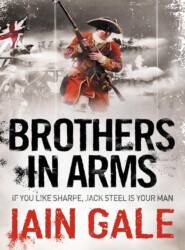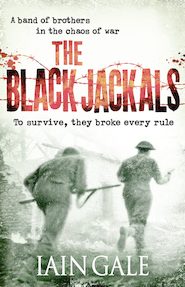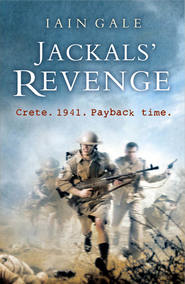По всем вопросам обращайтесь на: info@litportal.ru
(©) 2003-2024.
✖
Alamein: The turning point of World War Two
Настройки чтения
Размер шрифта
Высота строк
Поля
He walked off into the tent. Thomas turned to the men and removed his peaked cap. ‘Well. That told me.’
McGinty spoke: ‘Listen, Loot. Way I understand it we’re not under military law.’
‘We still have to take orders though.’
Turk shook his head: ‘But we ain’t what was the word? “Amenable to summary punishment”.’
Miller spoke: ‘In effect we’re camp followers.’
‘Sorry?’
‘In the old days, when an army went to war it took its baggage train and attached to the baggage train were always what they called “camp followers”. You know, wives, girlfriends, the guys who provided the food and water and beer. Bakers, blacksmiths. Well in a sense, that’s what we are.’
‘I ain’t no wife or girlfriend. And I ain’t no baker.’
‘But you are here to help the army. You’re part of the army establishment.’
It was true. They were not militarily trained and the British army was nervous of them. They had been given a basic course in the way the army worked and its organization and the idea of saluting by an RASC lieutenant shortly after they had landed. But soldiers they were not and never would be. They were misfits, thought Miller, and not for the first time he worried about how they would fit in in the thick of battle.
Thomas wiped the sweat from his forehead with a spotted handkerchief. ‘OK. Now Colonel Blimp’s gone I think we can relax for a while, boys. Turk, hows about a game of poker?’
Bigelow took off his glasses and began to polish them as he spoke. ‘Have you thought, Lieutenant, that this might not be such a great time to gamble?’
‘Say again?’
‘Well, sir. You see I reckon that you can only have a certain amount of luck. It’s what the Limeys say too. And by the law of averages, it stands to reason, don’t you think that if you use all your luck up here, playing cards with Turk, and winning all the time, then when we do get up to the battlefield your luck may just run out?’
Thomas laughed and began to deal: ‘OK, Turk and anyone else who wants to make a quick buck. Let’s play cards and see if you can win it all back from me before we have to move.’
SEVEN
8.00 p.m. Behind Bab Al Quattara Lieutenant Ralf Ringler
It was almost dusk when Lieutenant Ralf Ringler finally reached the area which for the last month had held the small command post of Panzergrenadier Regiment 104. For a moment though he wondered if he hadn’t taken a wrong turning somewhere back across the sand. It was easy enough to do in this wretched wasteland. For, instead of the stripped-back, rock-walled and sandbagged strongpoint to which he had become accustomed, there stood a huge tent. He stopped and stared at the wall of field-grey canvas and watched as the battalion orderlies went hurriedly in and out carrying boxes of rations and cases of wine. The battalion adjutant, Major Werter, came out puffing on a short cigar and, seeing Ringler’s absent-minded look, smiled and went towards him.
‘Ah, Ringler. There you are. You did get the invitation?’
‘Invitation?’
‘To the colonel’s party. Well, it would seem you did not. My apologies, but well here you are anyway. How d’you like our new accommodation? It’s only temporary I’m afraid. A present from our friends the Italians. They seem to have brought everything with them but the kitchen sink. Even women they say. Though where they might be now the devil knows.’
‘Well, sir, they did have a colony here. They seem to own half the houses on the coast road.’
‘I know the problems we’ve had with their damn damage claims. They’re meant to be our allies.’
‘Kind of them to lend us the tent though, sir.’
‘Yes, damn kind. Isn’t it splendid? Good target for the RAF too. This party had better be over damn quick. But good to be a bit festive. Well, you know, we had to push the boat out for the colonel’s birthday. Come inside and see the old man. He’ll be delighted you’re here. Be careful though Ralf. His hearing’s shot to pieces. Both eardrums perforated. Happened at Alam Halfa. He set up his OP directly beside an 88 battery. You’d think he’d know better at his age. Didn’t you know? Best not to mention it. You know how he is, he gets frightfully upset if he suspects that people think he’s deaf. Loves music: Beethoven, Wagner that sort of thing. You should hear him sing.’
They entered the tent and Ringler removed his field cap and tried to make his uniform look a little more presentable, bleached as it was by the sun to a sandy tan colour. At twenty-two Ringler was almost the baby of the battalion, but even so he was still a seasoned veteran. He had been fighting out here for the last two years, and the desert was etched into his brain.
Werter continued: ‘Now. Help yourself to a drink, Ringler. Witman has brought us some whisky. Courtesy of the British of course, taken on the road from Benghazi. And there’s even a case of Münchner Löwenbräu from the Aussies in Tobruk. And the Italians have also given us some wine. Kind of them.’
Ringler nodded his head: ‘Thank you, Herr Major.’
The colonel stood with his back to them in the centre of the tent, laughing in the middle of a circle of his battalion officers all of whom, unlike their CO, still wearing his peaked officer’s hat, had removed their headgear. Colonel Karl Ens was a hard-bitten veteran whose dark, sun-tanned face was marked with lines that bore witness to both laughter and anxiety. Ringler walked up to the group and was greeted with polite nods of the head. The colonel turned and saw him and not for the first time Ringler noticed the Knight’s Cross that hung at his neck.
‘Ringler. Good to see you. How are the men of Number Ten company?’
‘Fine, sir. We’re guarding a lane through the minefield belt.’
‘Ah, our Devil’s Garden. Our field marshal has done us proud, don’t you think, Ringler? What could break through that? Only a fool would try. And look at this. Look what they’ve all done for me. True comrades, Ringler, eh?’
‘Yes, Herr Oberst. It’s wonderful.’
The colonel squinted and inclined his head: ‘What did you say? Colourful?’
‘Yes, sir. Very good.’
The colonel smiled and nodded. ‘Very colourful.’ He laughed and shook his head. ‘Have a drink, Ringler. Take a glass of schnapps with me?’
‘I don’t think so, sir. I don’t often drink schnapps.’
Again the colonel squinted but this time Ringler was not so sure whether it was his deafness or because he was displeased at his apparently discourteous reluctance to drink the schnapps.
‘Yes, sir. Of course I shall have a glass of schnapps with you. Happy birthday, Colonel.’
The colonel smiled and drank the glass down in one. Ringler followed suit and managed to stop himself from coughing as the fiery, colourless liquid burned its way down his throat. Now he remembered why he didn’t drink the stuff.
The colonel was beaming now. ‘Very colourful, Ringler.’ He clapped Ringler on the back and turned away laughing.
The adjutant came up: ‘Well done, Ralf. The colonel will have his little jokes. You don’t care much for schnapps I think?’
‘Not as a rule, sir, no.’
‘Here, have a glass of beer. It’s good stuff and liberated too.’
Ringler took a bottle of the warmish beer and drained it, quenching the burning in his throat.
In a corner of the huge tent, one of the enlisted men, Lance-Corporal Kaspar, a talented musician from Bohemia, began to play on his harmonica. Inevitably the tune was Lili Marlene. Nevertheless, however many times Ringler heard it it always brought a lump to his throat. The colonel, hearing the tune despite his deafness, smiled and raised his glass.
‘A toast, gentlemen. To the Deutsche Afrika Korps and its unstoppable victory in the desert. On to Cairo and Suez.’
As one the officers echoed the colonel’s words: ‘On to Cairo and Suez.’ They raised their own glasses and drained them before resuming drinking at a more steady pace.
Ringler was standing inside the tent by the entrance next to a fellow lieutenant, Werner Adler, from Number Eight company, a blond, tall Aryan from Potsdam who had been an enthusiastic member of the Hitler Youth before joining the army, leading his local NSDAP boys’ group.
Ringler took another swig of beer and turned to Adler: ‘D’you really think we’ll get there?’











